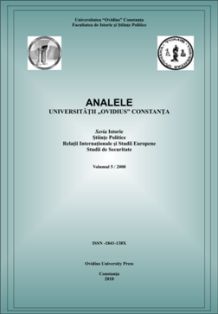BĂTĂLIA NAVALĂ DIN GOLFUL ABUKIR (1-3 august 1798)
The Naval Battle of Abukir Bay (1-3 August 1798)
Author(s): Ionel Dan Ciocoiu, Ovidiu Manuel GlodarencoSubject(s): History
Published by: Ovidius University Press
Keywords: Abukir; attack; Brueys; fleet; ship; Napoleon; Nelson
Summary/Abstract: In 1798, General Bonaparte had sought to invade Egypt, as the first step in a campaign against British India, in an effort to drive Britain out of the French Revolutionary Wars. As Bonaparte's fleet crossed the Mediterranean, it was pursued by a British force under Rear-Admiral Horatio Nelson, sent from the British fleet in the Tagus, to establish the purpose of the French expedition and defeat it. For more than two months, Nelson chased the French, on several occasions only missing them by a matter of hours. Bonaparte, aware of Nelson's pursuit, enforced absolute secrecy about his destination and was able to capture Malta and then land in Egypt without interception by the British force. The Battle of the Nile (also known as the Battle of Aboukir Bay), 1–3 August 1798, was the climax of a naval campaign that had ranged across the Mediterranean during the previous three months, as a large French convoy sailed from Toulon to Alexandria, carrying an expeditionary force under General Napoleon Bonaparte. The French were defeated by the British forces led by Rear-Admiral Sir Horatio Nelson. The battle reversed the strategic situation in the Mediterranean, allowing the Royal Navy to assume a dominant position it retained for the rest of the war. It also encouraged other European countries to turn against France, and was a factor in the outbreak of the War of the Second Coalition. Bonaparte's army was trapped in Egypt, and Royal Navy dominance off the Syrian coast contributed significantly to its defeat at the Siege of Acre in 1799, that preceded Bonaparte's return to Europe. Nelson, who had been wounded in the battle, was proclaimed a hero across Europe and was subsequently made Baron Nelson, although he was privately dissatisfied with his rewards. His captains were also highly praised, and would go on to form the nucleus of the legendary Nelsonic “Band of Brothers”.
Journal: Analele Universităţii Ovidius din Constanţa - Seria Istorie
- Issue Year: 2008
- Issue No: 05
- Page Range: 27-32
- Page Count: 6
- Language: Romanian

